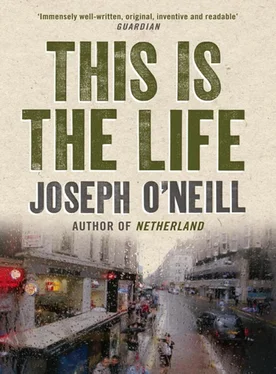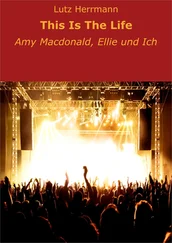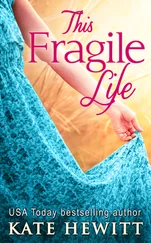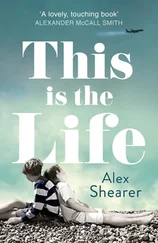Members of the jury, Mr Donovan himself has admitted that he has ruined my life. It happened a long time ago, it is true, over a decade ago — but it happened. He deflected me from my rightful path. It may be that you think that I am feeling a little too sorry for myself, that I should show more backbone and face the future like a man, and you may be right to feel this. Perhaps I am not as strong a man as I should be and perhaps, in this sense, I have contributed to my loss. That may be so. But Mr Donovan here, he should have known that before he started to ruin my life. He should have realized what stuff I am made of, he should have realized (he is a lawyer, he is familiar with the eggshell — skull principle) that I was a vulnerable party. Members of the jury, I ask not just for a compensatory award, but for exemplary, punitive damages. I ask for justice.
I sit down. Donovan has nothing to add. While the jury deliberates, I finish my bottle of wine. I see that it is 8 a.m.
I never heard what the verdict of the jury was. The next thing I knew I was waking up on the sofa in the mid-afternoon with a hammering dehydration hangover, my rashy face hanging pale and swollen in the mirror on the wall. It sounded, from the gurgles and rumbles that tremored down my chest to my stomach, as if trains were running through my body’s tunnels.
Sweating a little, I lit a cigarette and glanced around me, at the living-room. It did not look good. Empty wine bottles, junk food cartons, newspapers, fat-crusted dishes, socks, cigarette packs, underpants, rotting flowers and garbage of all kinds stood out in the harsh daylight. Dust particles swam around in the air and a big bluebottle jangled against a windowpane. I stubbed out my cigarette: my throat was too sore to smoke it down to the butt.
Then, after I had guzzled at a stream of lukewarm tapwater in the kitchen, I made a discovery. I felt lighter than I had done for days; I felt as though some freight had been unladen from my body.
I felt all right.
I pushed my feet into shoes and headed for the door. I had no special destination in mind, I just needed to get out. I did not bother to change, or to shave or wash. I just stepped out of the house the way I was.
I caught a bus. I sat on the top deck and smoked a cigarette. It was yet another cloudless, sunshiny day, and when, at the Elephant and Castle, the bus stood still for ten minutes in a tangle of traffic, it came to me that, yes, I was not mistaken, I was feeling better. Down below throngs filled the pavements and two guys in sunglasses in an old purple sports car were blasting out opera and setting everything to music. It was a shot in the arm, and for the first time in a while I envisaged being part of all that action down there.
Then a small smile visited me: something struck me: all at once, on top of this bus, I was seeing daylight. The knots and kinks that had roped and snarled up my mind had ravelled out, and suddenly the whole of the Donovan business looked different. I was seeing it in a new way, from a distance, from the vantage point of someone looking back. It looked as though I had moved on: moved on from the Donovan part of my life.
Yes, I thought. What Donovan saw in Arabella, why he had collapsed in court, why he had burned his manuscript, why he had not contested the divorce, why Arabella had left that message on the ansaphone, why his father had come and suddenly gone, why he had cried on the golf course — who cared? Not me, that was for sure. Me, I had lost interest. Whether Donovan threw himself off a cliff or scaled great heights, it was all the same to me. Good luck to him. During the boiling, therapeutic night I had disentangled my life from his, and that was that. This was not a case of forgive and forget: this was just a case of forget. Anyway, there comes a moment when forgetting is forgiving — amnesty, after all, flows from amnesia.
Yes, I was letting it pass, all of it. Bygones were bygones. I knew that if I looked long and deep enough into the vehement events of the past year — events which had, as far as I could see, expired suddenly and inexplicably — they would no doubt yield profound and interesting meanings, illuminations of the downfall of genius and of the mysterious causalities of history. But I did not want to know. I had cut the cord, and that was that.
The bus freed itself from the traffic and sped off. I lit another cigarette and settled back in a tingling frame of mind. I felt quickened, the window-framed scenes outside flitted by like a strip of film. We swerved up to the Strand via Trafalgar Square and the crowds, the jetting water, the flocks of pigeons; my cheek flattened against the window, I watched a baby in a pram, a policeman giving directions, a teacher waist-deep in schoolchildren and a couple holding each other and laughing, the woman tossing her head upwards and backwards in my direction.
It was Arabella, and the man — I had to lean over to check — was Michael Donovan.
At first I did not respond. Then, as the bus was stationary, I left my seat to look at them out of the rear window.
They were still there, walking along holding hands and kissing each other. They looked delighted. They could have been celebrating something, they looked so happy.
The bus started up and left them behind, amongst the crowds.
I could not believe it. They had got back together. Whether or not Donovan had dissuaded Arabella from finalizing the divorce, whatever the details of the matter were, one thing was clear: they were back together again. The Donovans were reunited.
Well, I said to myself, that was a matter for them. Me, I was not going to spend any time working out the hows and whys of their reconciliation. I had fish of my own to fry.
But when I returned home I had a small argument with myself. One part of me said that I should forget all about what I had seen, that it made no difference anyway, that I did not want to risk becoming involved with Donovan all over again. The other part said, Why should I dismiss the incident? Why shouldn’t I think about it? I would put my mind to it in the same way as I might mull over any other item of curiosity. There was no need for me to apply special prohibitions or security measures vis-à-vis Donovan; now that I had said boo to his ghost, I was able to contemplate him on equal terms, man to man.
The second part of me won the argument.
How had Donovan done it? How had he managed to turn Arabella? What kind of offer had he made?
No sooner had I asked myself this last question than something hit me, something slapped me across the face. It was not an offer that had won Arabella, it was an offering: he had burned the manuscript of Supranational Law for her.
Of course, I was speculating, and it was quite possible that the two mysterious events which I had brought together — the Donovans’ reconciliation and the conflagration of the book — were wholly unrelated. But my theory, my intuition, made sense. It added up.
I flicked a fresh cigarette out of my pack, lit up, and began walking quickly around the room; suddenly these currents, these juices, were flowing through me …
Everything was topsy-turvy again. So Donovan was a hero after all. Viewed in the light of the sacrifice he had made for Arabella, his story was a shining chapter in those great antagonisms, life versus art, man versus woman: faced with the stark choice of pursuing his love or his genius, he had gloriously and chivalrously chosen love. This might not have been history I was seeing, as I had originally thought, but it was certainly a love story. The boy had got the girl. I could see ‘The End’ rolling across the fined frame, a frozen shot of the two of them together, handsome and laughing, on the Strand.
Читать дальше
Конец ознакомительного отрывка
Купить книгу












